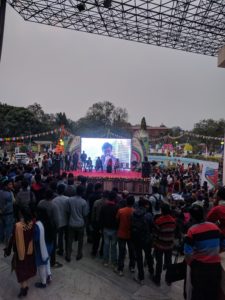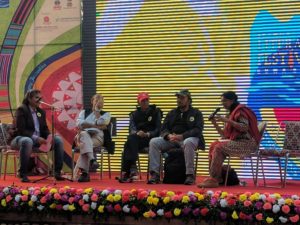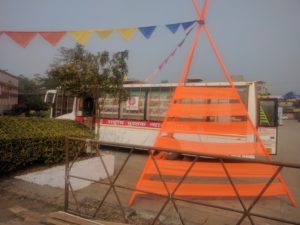Brahmaputra Literary Festival, Guwahati, Assam ( 28-30 Jan 2017)
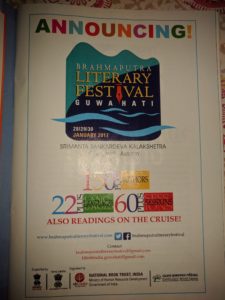 In late January the National Book Trust of India, Government of India and the government of Assam decided to jointly organise the Brahmaputra Literary Festival in Guwahati. There were over 60 panel discussions, book launches, cultural events etc organised. More than a 150 writers, artists, thinkers and publishing professionals were invited to participate. The focus was on the “languages, literature, culture, society, politics, performance traditions, music, identity, media of the northeastern region of the country but also national and international elements packages in the three-day event”.
In late January the National Book Trust of India, Government of India and the government of Assam decided to jointly organise the Brahmaputra Literary Festival in Guwahati. There were over 60 panel discussions, book launches, cultural events etc organised. More than a 150 writers, artists, thinkers and publishing professionals were invited to participate. The focus was on the “languages, literature, culture, society, politics, performance traditions, music, identity, media of the northeastern region of the country but also national and international elements packages in the three-day event”.
Given how hectic the litfest season can become in India this particular edition of the festival was a refreshing change. It was not the predictable handful of authors doing a Bharat darshan and along the way halting to make appearances at literary festivals. This festival was different. It had a crackling good mix of regional writers from all over India along with a few international delegates. It was heartening to note how all the guests were treated at par. The hospitality arrangements made by the organising committee were impeccable. Although this festival had been put together in less than a month it was commendable how well it had been curated. Irrespective of ideological positions a range of people had been invited highlighting the flourishing Indian literary scene as well encouragement of literature instead of extending invitation to drawing room coteries. The sessions were engaging with intense conversations. The strength of the audience varied but irrespective of the numbers they were focused, courteous and listening attentively. There was pin drop silence. The Kalakshetra venue was well suited for being centrally located and vast. The venues were far apart making it trifle inconvenient for having to walk large distances but a big plus point was it was possible to hear panelists without being disturbed by other parallel sessions.
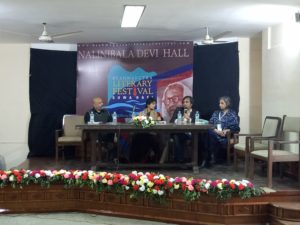
Panel discussion on “Demystifying publishing”. The panelists were ( L-R) Ravi Singh, Co-founder and publisher, Speaking Tiger Books, Jaya Bhattacharji Rose, Bhaskar Dutta-Baruah, Publisher, and Preeti Gill, Literary Agent.
Though the focus was on showcasing Assam and other north eastern states of India the programming was impressive. There were poets, writers, dramatists, activists, cinematographers, essayists, translators, performance poets, singers, actors, publishers from across India giving a rich insight into the vibrant diversity of Indian literature. From the hyper-local to the broader literary landscapes were represented. For instance ranging from a session on the local poets whose ancestors migrated from Bengal so now speak a mix of Assamese and particular kind of Bengali which makes them a distinct community to sessions on conflict and literature showcasing incidents such as the incarceration of the Indian-Chinese 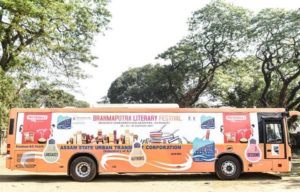 community by the Indian government in the 1960s to more recent instances have been preserved in contemporary literature. There were panel discussions on publishing such as children’s literature and understanding the publishing process. A testament to the crackling literary milieu was the heated discussions that took place between Sanjoy Hazarika and Francois Gautier during their panel discussion “The word in public space”. Sanjoy Hazarika posted a note about it on Facebook.
community by the Indian government in the 1960s to more recent instances have been preserved in contemporary literature. There were panel discussions on publishing such as children’s literature and understanding the publishing process. A testament to the crackling literary milieu was the heated discussions that took place between Sanjoy Hazarika and Francois Gautier during their panel discussion “The word in public space”. Sanjoy Hazarika posted a note about it on Facebook.
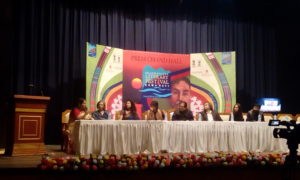
Lit Mart introduced by Dr Rita Chowdhury, Director, National Book Trust. Panelists included Preeti Gill, Nabin Baruah, Jaya Bhattacharji Rose, Bhaskar Dutta-Baruah, Ravi Singh and Srutimala Duara.
A fascinating experiment called Lit Mart was also inaugurated and conceived by the director of NBT, Dr Rita Chowdhury. It consisted of a panel of Assamese and English publishers, literary agents and publishing professionals who listened to manuscript ideas and synopsis. The authors ranged from school children to experienced writers, translators, professionals who were also engaged in writing and even ex-insurgents. And yes, some contracts — mostly Assamese but one English too– were offered by the time the session was over.
There was a festive air and the locals had come dressed as if it were a special occasion especially on Sunday. Even when the school expeditions were organised the students were well behaved and trooping into listen to the panelists. There was little fidgeting and definitely no mobile phones ringing or flashing.
Sure there were teething problems — co-ordination glitches, lack of golf carts/ vans to fetch and carry people as is done at the world book fair held annually at pragati maidan, the food court was at the far end instead of being midst of hustle-bustle and since the dinners held for delegates were not well lubricated the participation was thin as people made their own arrangements. Having said that this litfest was organised by NBT within two weeks of the conclusion of the world book fair. Hence the effort put in to put together this show by the team was impressive. In fact the undercurrents were positive and indicate potential in subsequent editions if the literary festival is managed well. Already there were understanding touches to the organising such as parking an NBT bookmobile at the venue where an entire row was dedicated to literature translated in to Assamese, having an independent bookshop that sold titles of participating authors and publishers, and author signing sessions. There is a strong local reading culture with a thriving literary tradition in the north east. There is no reason why this festival cannot succeed.
6 February 2017

